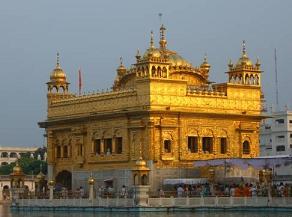 |
The Sikhs, derived from the Sanskrit word for “disciples” are perhaps one of India’s most recognizable groups. Sikhs constitute about two per cent of the Indian population. Beards and turbans give them a very distinctive presence, and are both politically and economically significant. There are Sikhs living in all the major cities of India and playing an important role in all India’s major institutions. Sikhism is a fairly new religion, which
broke away from Hinduism in the 16th century. Sikhism grew in response to friction between Hindus and Muslims in Punjab provoked by the terrible repression by the Muslim rulers, who tried to forcibly convert the Hindus. Aurangzeb was so hostile to Sikh religion that he offered as reward a gold coin to any citizen who brought the severed head of a Sikh. |
|
Due to this, the tenth Guru, Guru Gobind Singh, enjoined upon all Sikhs to take the surname ‘Singh’ (Lion) and turned them into a volunteer army always ready to fight the Muslim rulers. Sikhism was founded by Guru Nanak, and originated as a Bhakti movement, but rejected the caste system and treated everyone equally. The Sikhs believe in one God and worship Him in their temples called gurudwaras. Their holy book is the Granth Sahib, a collection of the teachings of their Ten Gurus and other contemporary saint. The Guru Gobind Singh, ordered that there would be no more Gurus after him and that their sacred book, the Granth Sahib, alone should be read for guidance. Their holiest city is Amritsar with its Golden Temple called Harmander Sahib. Sikhs are known for their pragmatism, humour, common sense, bravery and valour. |
Before the partition of India and Pakistan in 1947, the Sikh community was spread evenly across the Punjab, but the region was divided into two by the international boundary created between India and Pakistan. Partition was preceded by savage Muslim-Sikh riots, and although some of their most sacred places were in Pakistan, Sikhs opted to become part of India, where the secular constitution seemed to offer better guarantees of long term security. Over 2.5 million Sikhs left Pakistan for India. However, their loss of rich agricultural land, and the reduced opportunities in military and other services, led to a sense of resentment and demands for fuller political autonomy within India. Although in 1965 they won the demand for a Punjabi speaking state, Punjab has remained a center of political unrest. Today over 90% of the 15 million Sikhs in India live in the Punjab, Haryana and Delhi. There are also significant emigrant communities abroad.
|
Sikh Beliefs
Sikkism rejected the idolatry and worship of any objects or images. Possibly reflecting the influence of Islamic beliefs, Guru Nanak also opposed discrimination on the grounds of caste. Some of Guru Nanak’s teachings are close to the ideas of the saint Kabir, who, in common with the Muslim mystic Sufis, believed in mystical union description. He also believed that the God is present everywhere, visible to any one who cared to look, and essentially full of grace and compassion. His belief in the nature of God was matched by his view that man was deliberately blind and unwilling to recognize God’s nature.
He transformed the Hindu concept of maya into
meaning the unreality of the values commonly
held by the world. |
 |
|
Guru
Nanak held that salvation depended on
accepting the nature of God. If man
recognized the true harmony of the
divine order (hukam) and brought
himself into line with that harmony he
would be saved. However, Guru Nanak
rejected the prevailing Hindu belief
that such harmony could be achieved by
ascetic practices. In their place he
emphasised three actions; meditating
and repeating God’s name (nam),
giving or charity (dan) and bathing (isnan). |
Sikh Worship
Today, the meditative worship is a part of the life of every Sikh devotee. Various Sikh homes have a room which is set aside and houses a copy of the Guru Granth, and members of the house start their day with private meditation and a recitation of the meditative verses of Guru Nanak himself, the Japji. However from the time of the 3rd guru, Sikhs have also worshipped as congregations in temples known as Gurudwara (“gateway to the Guru”). The Golden Temple in Amritsar is the holist site of the Sikhism which was built by Guru Arjan at the end of the 16th century.
The present institutions of Sikhism belongs to the reform movements of the 19th century. Under the Sikh Gurudwaras Act of 1925 all temples were restored to the management of a Central Gurudwara Management Committee, thereby removing them from the administrative control of the Hindus under which many had come. Since then this body has acted as the religions’s controlling body. |

